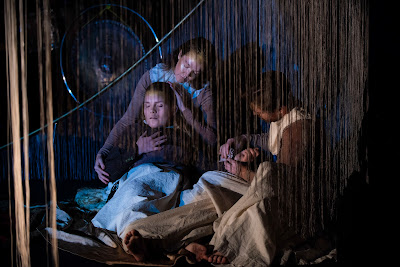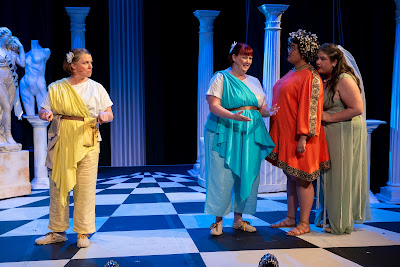WHAT: Biographica
WHEN: 21 September - 1 October 2023
WHERE: Theatre Works (Acland St)
MUSIC BY; Mary Finsterer
LYRICS BY: Tom Wright
DIRECTED BY: Heather Fairbairn
CONDUCTED BY: Patrick Burns
DESIGN BY: Savanna Wegman
LIGHTING BY: Niklas Pajanti
PERFORMED BY: Helen Bower, Melody Chia, Julia Cianci, Belinda Dalton, Tom D'Ath, Elyane de Fontenay, Rosa Hwang, Rachael Joyce, Douglas Kelly, Dion Mills, Juel Riggall, Ely Ruttico, Mira Stephens, Laura Tanata, Terrence Teo, Brandon Waterworth, Tim Willis, and Raphael Wong
VIDEO BY: Aron Murray
STAGE MANAGED BY: Brittany Stock
 |
| Rachael Joyce, Juel Riggall, and Douglas Kelly - photo by Jodie Hutchinson |
For a short period at the start of this century
Chamber Made was producing small but magnificent new operas of the scope and scale of the show being presented at
Theatre Works right now. Sadly, Melbourne has lost that resource as the company has moved in a different direction now. On the other hand,
Lyric Opera has sprung up and moved into that space. Whilst this season of
Biographica is not a premier (it was first staged in 2017 in Sydney) it demonstrates how important it is to bring these stunning new works to other parts of the country to inspire and invigorate an art form struggling to be seen as relevant in our ever-progressing performance syntax.
Biographica is a surrealist exploration of the life of Renaissance man
Gerolamo Cardano (1501 - 1576). Who? You may not know his name, but you know this man's work. He invented algebra, developed probability calculations (the way to work out betting odds), and - among other things - invented the gimbal and the basis of the combination lock. Without him we wouldn't have compasses, binomial coefficients, or a systematic use of negative numbers.
Cardano was a mathematician, a physician, a philosopher, and a rampant gambler and playboy. The unwanted illegitimate son of a lawyer, Cardano went on to marry and have three children, all of whom died in ignomy. Cardano himself died at the hands of the Inquisition after accusations of heresy.
Mary Finsterer is a dynamic contemporary composer who works to meld the music of the Renaissance with the modes of today. The life of Cardano was perfect fodder for this obsession and it shows in the composition of the music in
Biographica. Finsterer plays with the progression of music in the 16th century, mirroring
Tom Wright's tale of the life and times of an amazing thinker who changed the world.
The show opens with golden guardian spirits singing the prelude in stillness. A static tableau allows the music to establish itself and its intentions. Early in the 1500's church music was still using Gregorian style chants and this style influences the early movements in Biographica. However as the century moved forward secular music began to be included in sacred circles and Finsterer plays with that, introducing a jaunty madrigal into what had been established as a formal and processional space. The tensions between these styles play with the tensions between the protagonist and his children as his life story unfolds.
One thing to know about the music of that time is that it was slower. The standard note in the Renaissance was the semi-breve compared to today where it is the crochet. Also at that time there was a move towards featuring vocals over instruments. This is when the basso continuo became de rigeur, and music embraced the cantus firmus and polyphony. All of this becomes evident as the voices of the singers fills the Theatre Works auditorium and vibrate through the body - a little bit uncomfortable and a whole lot sensuous.
In the 1500's vocal music became more expressive and singers where given permission to explore and luxuriate in the notes. This creates extraordinary effects on the body but I have to admit it does get in the way of intelligibility of the lyrics. Biographica is sung in English, but I do think it needs surtitles - not because of articulation problems, but because it is a style we are not conditioned to hear and understand anymore. It does show the measure of skill and ability of the singers though!
Belinda Dalton (soprano) has a powerful voice which is weapon of mass impression! The other soprano,
Rachael Joyce, has a gentler tone perhaps but is still as impactful and she plays the dying daughter with pathos and authenticity. Hearing her cry out for her father's love on her death bed almost brought me to tears.
Juel Riggall brings incredible acting skills along with her beautiful mezzo-soprano voice to her roles. Riggall never drops out of her characters at any moment, even when she is chorus. She is always engaged and engaging.
Douglas Kelly (tenor) displays an incredible range and his falsetto is as sweet as any choir boy's. Playing the younger son, Aldo, he faces his father down as he points out the sins of the father must necessarily be the downfall of his son.
Raphael Wong (baritone) brings a surprising softness to his deep tones as he examines the torment his cheating wife bestows on him.
One of the things which makes
Biographica different and modern is the non-singing character of Cardano himself, played by
Dion Mills. The story begins at the moment of his death. It is a solipsistic rememberance of his life.
A curious truth about European religion is how astrology and Christianity became entwined whereas these days we think of them as separate and conflicting ideologies. If you tour the churches of Europe you will see all sorts of astrological iconography all over them. It is fascinating and confusing for us now, but Cardano's obsession with the stars and their impact on humans was commonplace back then. He begins and ends asserting he always predicted exactly when he would die.
Mills is outstanding as Cardano. The role is not easy because although it is spoken, it is definitely metered and pitched with musical imperative. He does it well, carrying the visage of the harried genius orator comfortably. Walking around and peering into the fringed gimbal hoops created by designer
Savanna Wegman, Cardano watches his memories reveal themselves.
Perhaps a flaw in the structure of this opera is that there is no evidence of insight or revelation but perhaps there doesn't need to be any. He is about to die after all... More disappointingly is that his amazing discoveries and inventions are only hinted at through some muttering at his workbench and some quite magnificent projections (
Aron Murray). The core of the work focusses on his family and his personal failings. I would have liked a better balance between the two.
Wegman's set is stunning in it's simplicity and
Niklas Pajanti has lit it beautifully. Whilst not exactly a contemporary of Cardano (
Caravaggio was born 5 years before the inventor's death), Wegman and Pajanti have used the tonal palette and chiarascura effect of the great painter's works. Real candles glow and flutter on Cardano's workstation and Pajanti has managed to use the lights to expand the yellow glow to exude across the stage to light a shadowy world. Even the ubiquitous smoke machine centres around those flames and the haze is allowed to gently float above the performers rather than engulfing them (and us).
The orchestra consists of instruments of the time - mainly strings and wind with some percussion. An electronic keyboard sits among the historical instruments, playing the continuo role historically owned by the harpsicord or organ. All of it making up a gentle and exquisite back line to the emerging expression and exploration of the voices.
Director
Heather Fairbairn has led the
Biographica team to create a magnificent visual diarama which allows
Patrick Burns (conductor) to showcase the music as it expands and embraces the audience. Both production and music take control immediately and lead us through a shadowy world of human frailty and magnificence.
Biographica is a wonderful chamber opera. If we had more of these and less of those behemoth productions by the major companies I think more people would make opera a part of their regular live theatre repertoire. Finsterer and Wright have combined forces to create an incredible opera. Thank you Lyric Opera for bringing this to Melbourne.
4.5 Stars







